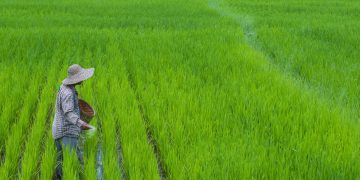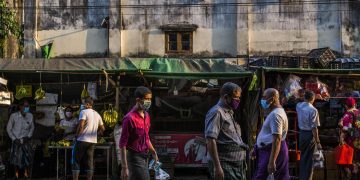Crop traders link farms with food processors and exporters. However, the pandemic has disrupted their normal operations. What policies can improve business conditions for traders and mitigate COVID-19 effects for farmers and consumers?
The IFPRI-Myanmar Food Vendor Survey aims to provide data and insights on the effects of shocks to Myanmar’s food markets. The survey is conducted with about 200 food vendors in rural and urban areas throughout the country and explores changes in consumer behaviors, difficulties in food vendor operations, changes in the availability and prices of foods, and COVID-19 prevention measures. The Food Vendor Survey was initiated in June 2020.
New evidence on the economic impacts of COVID-19 in Myanmar
A severe second wave of COVID-19 infections has led to lockdowns since mid-September—the second set of strict controls imposed after the initial outbreak in the spring. Derek Headey and colleagues have monitored monthly trends in poverty and food insecurity, and found the lockdowns have dramatic impacts.
COVID-19 and last mile delivery: Challenges for retail shops (late July)
COVID-19 may have significant impacts on traditional food retail shops, which affects the availability and affordability of food for consumers. In this blog post, IFPRI researchers assess how the pandemic is affecting retailers in urban areas.
COVID-19 and last mile delivery: Challenges for retail shops (early July)
COVID-19 may have significant impacts on traditional food retail shops, which affects the availability and affordability of food for consumers. In this blog post, IFPRI researchers assess how the pandemic is affecting retailers in urban areas.
Crop trading during the pandemic: Lessons learned in Myanmar (Late June)
Crop traders link farms with food processors and exporters. However, the pandemic has disrupted their normal operations. What policies can improve business conditions for traders and mitigate COVID-19 effects for farmers and consumers?


